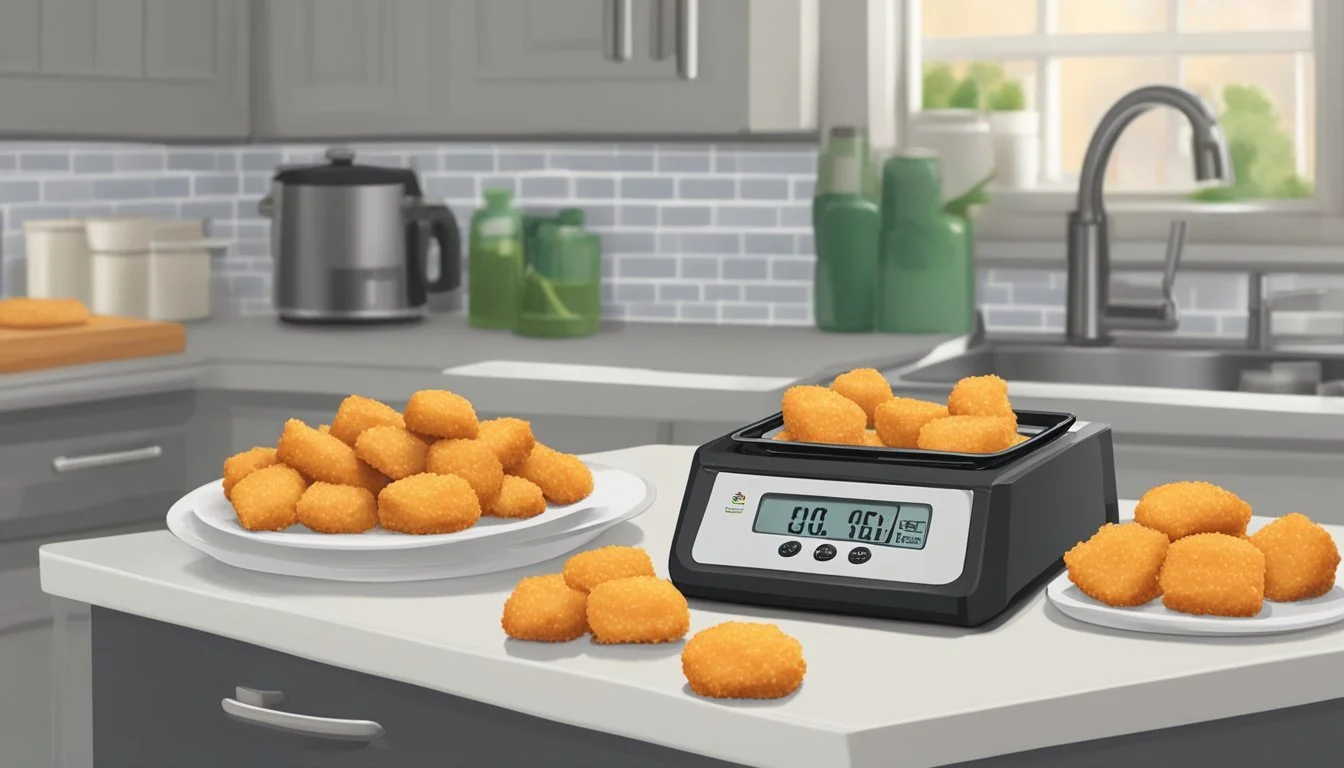How Long Do Chicken Nuggets with Cheese Last?
Proper Storage and Shelf Life Explained
When it comes to enjoying chicken nuggets with cheese, knowing how long they stay fresh is essential for both taste and safety. Chicken nuggets with cheese can last up to three to four days in the refrigerator if stored properly in airtight containers. This ensures that the cheese doesn't spoil and the chicken retains its quality.
It's crucial to consider several factors, such as the expiration date of the ingredients and the storage conditions, to maximize their shelf life. Homemade nuggets tend to have less preservative content, so they might not last as long as store-bought or fast food options.
For those who want to enjoy chicken nuggets with cheese beyond a few days, freezing is a viable option. Properly stored in freezer bags or airtight containers, these nuggets can last for up to one to three months. This allows you to prepare in advance and enjoy a quick, delicious snack whenever you have a craving.
Understanding Chicken Nuggets with Cheese
This section covers the components of chicken nuggets and the role of cheese in enhancing their flavor and texture. Different ingredients and techniques will be explored to provide a comprehensive understanding of this popular dish.
Composition of Chicken Nuggets
Chicken: The base of homemade chicken nuggets often consists of ground chicken or finely chopped chicken breasts. Chicken breasts, when used, should be cut into small, even pieces to ensure uniform cooking.
Breading: A mixture of flour, breadcrumbs, and eggs typically forms the outer coating. This helps create a crispy texture. Variations can include seasoned breadcrumbs or panko for added crunch.
Seasonings: Common seasonings include salt, black pepper, garlic powder, and onion powder. These seasonings are mixed with the chicken to ensure each nugget is flavorful inside and out.
Binding Ingredients: Eggs and a small amount of flour act as binding agents. This helps maintain the shape of the nuggets during cooking, whether they are baked or fried.
Cheese Integration in Nuggets
Cheese Choices: Shredded mozzarella is a popular choice due to its excellent melting properties. Other cheeses like cheddar or gouda can also be used, depending on personal preference.
Incorporation Techniques: Cheese can be mixed directly into the chicken mixture or placed in the center of each nugget. Mixing cheese within the chicken ensures even distribution, while placing cheese in the center creates a molten core.
Flavor and Texture: The cheese adds a rich, creamy texture and enhances the overall flavor profile of the nuggets. It introduces moisture, which keeps the nuggets tender.
Cooking Considerations: When cooking, ensure the cheese is fully melted and integrated with the chicken. Proper cooking techniques help avoid the cheese leaking out, maintaining the nuggets' structure and flavor integrity.
Storing Chicken Nuggets
Proper storage is essential to maintain the quality and safety of chicken nuggets with cheese. It's vital to know the right methods for both short-term and long-term storage.
Short-Term Storage
Chicken nuggets with cheese should be stored in the fridge if they are to be consumed within a few days. It is ideal to place them in an airtight container or wrap them tightly in plastic wrap to prevent moisture loss and contamination.
Shelf Life in Fridge:
Homemade: Best consumed within 2-3 days.
Store-bought (cooked): Up to 3-4 days.
Store-bought (uncooked): Check the expiration date and consume before it.
Ensuring they are stored at a consistent temperature below 40°F (4°C) is necessary for maintaining their quality and preventing the growth of harmful bacteria.
Long-Term Storage
For longer storage, freezing is recommended. Chicken nuggets with cheese can be stored in the freezer to extend their shelf life considerably. They should be placed in freezer bags or airtight containers to prevent freezer burn and maintain their quality.
Shelf Life in Freezer:
Cooked Nuggets: Can last for 1-3 months.
Uncooked Nuggets: Can be stored for 3-4 months.
Before freezing, ensure the nuggets are cooled to room temperature if they have been cooked. Label the containers with the date to keep track of their shelf life. When ready to eat, ensure they are heated thoroughly to an internal temperature of 165°F (74°C) for safety.
Safety and Spoilage
Ensuring the safety and quality of chicken nuggets with cheese involves recognizing spoilage indicators and following best practices to prevent foodborne illnesses. Proper storage, handling, and awareness of signs of spoilage are essential for food safety.
Identifying Spoilage
Spoiled chicken nuggets with cheese exhibit specific signs that indicate they are no longer safe to consume. One key indicator is an off smell. Fresh nuggets should have a neutral aroma, but if they start emitting a sour or putrid odor, they should be discarded.
Appearance changes can also signal spoilage. Look for discoloration or mold growth, especially around the cheese. Additionally, a slimy texture on the surface of the nuggets suggests bacterial growth, making the nuggets unsafe to eat. It's important to check both the chicken and the cheese for these signs.
Preventing Foodborne Illnesses
To prevent foodborne illnesses, proper handling and storage of chicken nuggets with cheese are critical. Store cooked nuggets in the refrigerator and consume them within three to four days. If you freeze them, do so for no longer than one to three months to maintain quality.
Always cook chicken nuggets to an internal temperature of at least 165°F (73.9°C) to ensure that any harmful bacteria are killed. Preventing cross-contamination is also crucial—use separate utensils and cutting boards for raw and cooked chicken nuggets.
Adhering to these practices will help maintain the quality of chicken nuggets with cheese and minimize the risk of food poisoning. Proper food safety measures are essential in ensuring the enjoyment and healthiness of this popular dish.
Reheating Nuggets
When reheating chicken nuggets, the goal is to maintain their crispy texture and delicious taste. The methods below provide guidance for reheating using either an oven or air fryer, and a microwave.
Using an Oven or Air Fryer
For optimal crispiness and even heating, an oven or air fryer is ideal. Preheat the oven to 350°F (175°C), and spread the nuggets evenly on a baking sheet lined with parchment paper. Bake for about 8 to 10 minutes, flipping them halfway through to ensure they become golden brown. This method revives the crispy texture and taste of the nuggets effectively.
In an air fryer, set it to 375°F (190°C) and arrange the nuggets without overlapping. Cook for approximately 5-7 minutes until they are crispy and hot. This method provides a quick and effective way to achieve a texture similar to freshly cooked nuggets.
Microwave Reheating
Microwaving is the fastest way to reheat chicken nuggets, though it might slightly affect their texture. Place the nuggets on a microwave-safe plate and heat them for 2-3 minutes. To reduce sogginess, consider using a microwave crisper or microwaving the nuggets on a paper towel to absorb excess moisture.
For enhanced crispiness, microwave the nuggets for 30 seconds before transferring them to a broiler or grill. Grill them for an additional 2-3 minutes. This extra step can help achieve a more desirable texture.
Maximizing Nugget Quality
Maintaining the quality of chicken nuggets with cheese involves ensuring they keep their flavor and texture, as well as avoiding common storage mistakes. This helps keep the nuggets fresh and enjoyable to eat.
Protecting Flavor and Texture
To maximize freshness and texture, store chicken nuggets in an airtight container. This prevents moisture loss and freezer burn, which can deteriorate both flavor and texture. If frozen, they should not touch each other to avoid sticking.
When thawing, place them in the fridge rather than at room temperature. Slow thawing maintains texture and reduces bacterial growth. Do not refreeze once thawed, as this can lead to a slimy texture and compromised quality.
Ensure the nuggets are cooked before freezing, as raw chicken can break down more quickly. Maintain a consistent temperature in your freezer to avoid freeze-thaw cycles, which can negatively affect the food.
Avoiding Common Mistakes
A few common mistakes can ruin the taste and texture of chicken nuggets with cheese. Failing to store them in proper conditions might lead to issues such as freezer burn. For best results, use high-quality freezer bags or vacuum seal the containers.
Avoid leaving the nuggets at room temperature for too long before storing them, as this encourages bacterial growth. This is especially important with cheese-containing products, which are more prone to spoilage.
Monitor dates carefully and consume within recommended timeframes. Cooked nuggets generally last up to 3-4 days in the fridge, while frozen nuggets can be stored for up to 1-3 months. Following these practices helps keep the chicken nuggets fresh, flavorful, and safe to eat.







